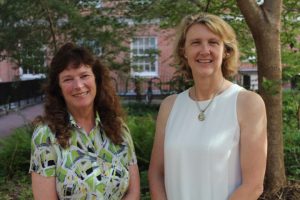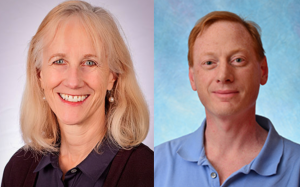Physician-scientists are uniquely positioned to transfer clinical insights to research discoveries, to return a better understanding of human disease to the clinic. A new initiative led by Laura Loehr, MD, PhD, MS, associate professor in general medicine and clinical epidemiology, and Susan Hogan, PhD, MPH, associate professor in nephrology, will help junior faculty in the department of medicine achieve an independent research career and the grant support that makes it possible.
“We want to cultivate early career development awards because these build the foundation for continuous faculty research,” said Janet Rubin, MD, vice chair of research in the department of medicine. “There are multiple ways that the department hopes to achieve this. We have a track that brings people in at the earliest stage–the Physician-Scientist Training Program–but clinical fellows can enter the process at any time. Being awarded a K-level grant is a good way to have protected time that gets your research career on track.”

K-level, career development awards
Interns, residents and subspecialty fellows make up the physician-scientist pipeline, and are usually doing research with an established mentor, or working on a plan to identify one, by the time they meet with Loehr and Hogan.
“If one of your main missions is research, and you are a new faculty member, or looking to be one, you should probably talk with us now to see if this is right for you,” said Hogan, who has served as a national peer reviewer for the NIH Center for Scientific Review for many years.
“We want to meet with candidates earlier rather than later because research plans take time to develop, with realistic timelines, as we think through how to position their research based on where they are and how they can advance.”

Career development awards give researchers protected time, protecting up to 75% of their time for research. In addition to NIH K-level awards, career funding may come from professional societies, such as the American Society of Nephrology, or patient-support foundations such as the Cystic Fibrosis Foundation.
Loehr, who comes from NC TraCS where she worked in the education core to support career development for 10 years, will work with Hogan to build on the legacy of Dr. Eugene Orringer and the nurturing environment he created for young physician-scientists at UNC.
“This initiative is meant to complement the department’s current research infrastructure, providing coordinated access to funded research, and there will be many ways to contribute and provide support,” Loehr said. “In some cases, we will follow junior faculty who are just getting started in research but not yet ready to apply for a K-award,” said Loehr. “Others will be resubmitting awards and will benefit from our review, with an eye on the programmatic details.”

R-level grant writing groups, for basic science and patient/population health
R-level grant awards support researchers on the path to becoming principal investigators, who have enough data to merit a robust award. Rubin and Alex Duncan, MD, PhD, from the division of infectious diseases, lead the department’s R-Level Grant Writing Group in basic science.
“We work on understanding the data and helping to craft a grant that makes sense of the data,” Rubin said. “We don’t accept candidates if we don’t think they can successfully compete for an R-Level grant. In the past six years, 85% of candidates have been awarded R-Level grants within three years of starting the program.”
Darren DeWalt, MD, MPH, chief of the division of general medicine, and John Baron, MD, MS, MSc from the division of gastroenterology and hepatology, lead the department’s R-Level Grant Writing Group in patient and population health, fostering research related to etiologic epidemiology, health outcomes, patterns of health determinants, and associated policies and interventions.
“We invite candidates who are interested in preparing their first R01, to meet with us,” said DeWalt. “If we feel they are ready, we set up a coaching schedule to help them organize their ideas and position their research question so that it is compelling and answerable.”
The bench to bedside and back-to-bench cycle moves both medicine and science forward in the UNC Department of Medicine. Visit Research Highlights to find ongoing research across the department.